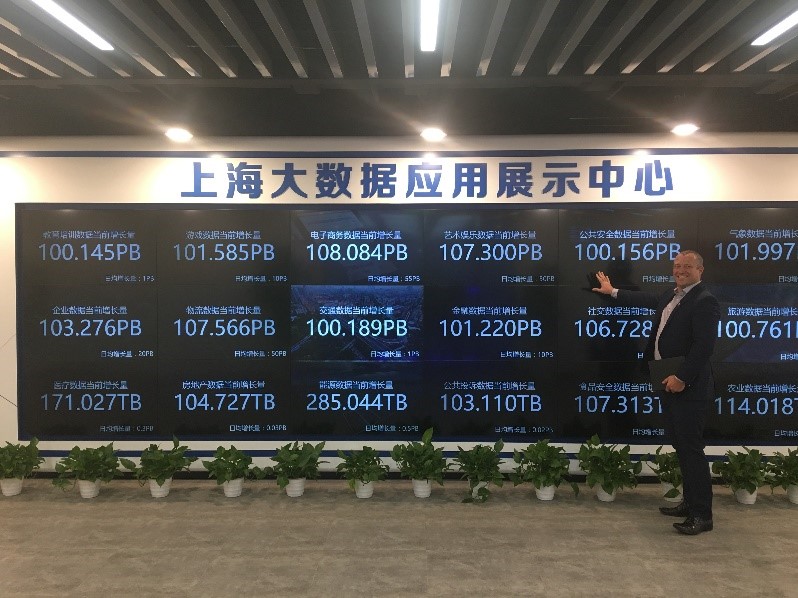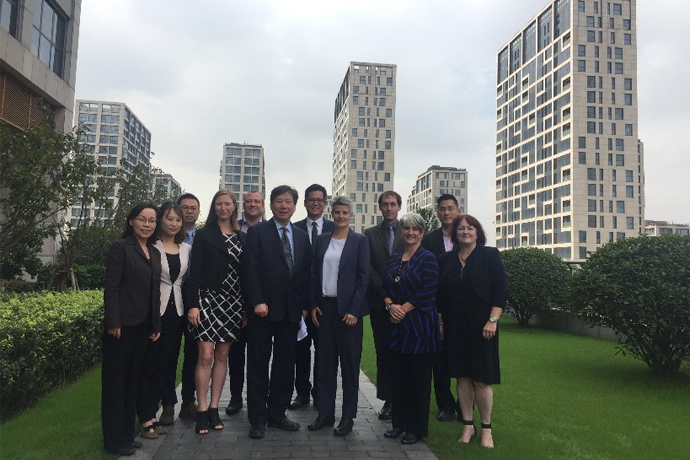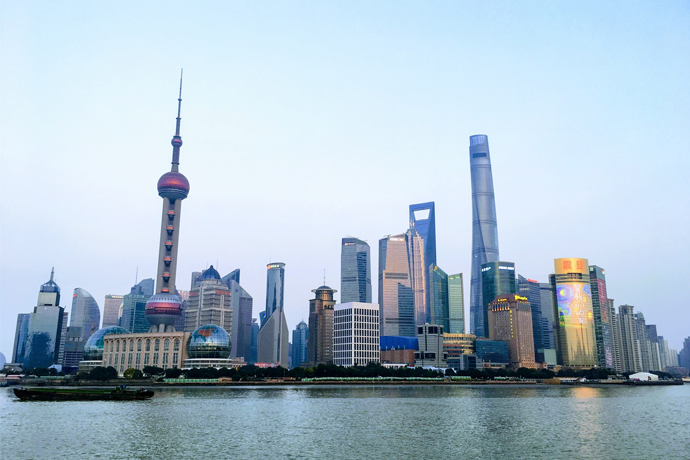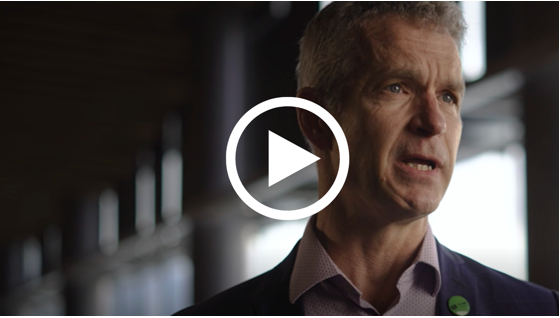By Paul Shorthouse, Senior Director of Partnerships at GLOBE Series
I was lucky enough to travel to Shanghai in October of this year with fellow Canadians from Victoria, including Mayor Lisa Helps, as part of a trade mission organized by the South Island Prosperity Project team, the region’s economic development group. My visit focused on a few important objectives:
- Explore clean technology partnership and investment opportunities between Canadian and Shanghai-based companies, institutions, and investors;
- Establish and solidify relationships with potential Chinese companies and government officials interested in attending the Smart City and Economic Prosperity Summit in Victoria and the GLOBE 2018 Forum in Vancouver in March 2018; and
- Meet with Shanghai municipal agencies to learn more about their smart city initiatives and priorities.
I’d never been to China before and it made a big impression on me. Shanghai alone is home to 24 million people, which is hard to get your head around as a Canadian. It’s clean, affluent, and cosmopolitan, although the contrast between new and old is striking. Bamboo scaffolding is all over the city, but so are sensors and smart phones.
An Economy in Transition: From “Made in China” to “Made by China”
China’s goal is to move away from being the “factory of the world” towards one driven by the innovation economy. The shift will be rooted in plans for high-quality production and advanced manufacturing, powered by green and clean technologies.
China’s clean technology agenda already includes ambitious goals:
- Renewable energy over coal-powered electricity production. China has quickly become a dominant player in clean electricity production and related technology, with plans to spend at least USD $360 billion on renewable energy by 2020 in order to increasingly power its own cities and industries.
- Rapid adoption of electric vehicles. The transition to electric vehicles (EVs) is being accelerated in China thanks to significant incentives. Shanghai, for example, offers free license plates to EV owners, a savings of $11,000 over conventionally-fueled vehicles. The city of Shenzhen (home of Chinese automaker BYD Co Ltd) has already deployed 14,000 electric buses and more than 2,000 electric taxis.
- An increasing focus on smart cities. Sensors, Internet of Things (IoT) devices, big data analytics, and other technology are increasingly helping Chinese cities improve the efficiency of service delivery and the overall quality of life for millions of urban residents.
China is rapidly becoming a leader in these areas. They recognize the benefits in terms of improved quality of life and a cleaner environment, and are benefiting economically as the world’s largest exporter of EVs, as well as renewable energy technology (e.g., wind and solar). They also recognize the opportunities to share what they’ve learned with the world.
A Decade-Long Journey to Make China’s Cities Smarter
As some readers might be aware, Infrastructure Canada launched its Smart Cities Challenge two weeks ago. The challenge will be a competition between Canadian cities to see who can develop the best proposals for improving the quality of life for local residents through the application of “smart” technologies.
![]() Smart city: A city that uses technology and data to improve livability and opportunities for the city and its people.
Smart city: A city that uses technology and data to improve livability and opportunities for the city and its people.
Victoria and surrounding municipalities have banded together to spearhead the Smart South Island initiative. Efforts are underway to develop a 2040 vision and strategic plan to improve the region’s quality of life across a number of themes, including economic resiliency, transportation and mobility, housing and affordability, human health, and the environment. The South Island Prosperity Project hired The Delphi Group to assess the opportunities for Greater Victoria in line with global smart city best practices. The China trip was an important part of this research, with Shanghai being out in front in terms of what’s possible.
Shanghai is already on its third smart city strategic plan, with a goal to make the city a recognized ‘international city of excellence’ by 2040. Their current priorities are addressing challenges around rapid urban population growth and service delivery, land and energy limitations, as well as promoting equal access and inclusion for residents in all regions.
A meeting with the Shanghai Municipal Commission for Economy and Informatization (the municipal agency tasked with developing and implementing Shanghai’s smart city plan) revealed a number of priority investments and projects, including:
- Foundational investments in ‘smart’ infrastructure, including sensors and cameras designed to collect real-time data and feed it back to city departments. This infrastructure is enabling improvements to city life, including traffic flows and road safety, as well as the ability to address issues in real-time as they arise, such as fixing faulty fire hydrants, restoring power after outages at the building or district level, and replacing missing manhole covers when disturbed.
- Free Wi-Fi hot spots all over the city (e.g., hotels, airports, universities, and converted public phone booths). This is enabling greater access to services and real-time information for residents and visitors alike, improving overall inclusiveness of smart city efforts (although limited bandwidths present challenges with data download speeds given the number of users).
- Citizen Cloud, a cloud-based platform and mobile app. With more than 7 million users, Citizen Cloud aggregates and streamlines more than 100 government services for Shanghai residents, including their drivers’ license information, a range of community services, and health care records.
- Competitions and other efforts that engage market players and the private sector. These activities use municipal ‘open data’ to develop new applications and services, unlocking smart city innovations that are improving the quality of life for local residents.
Finally, Shanghai has developed a cutting-edge ‘Big Data Exchange’, where open data that has been captured through various sensors and other sources across the city is packaged and sold on an exchange (similar to a stock exchange). The data can then be leveraged by others and used to develop a very wide range of useful public information tools and dashboards. The data helps to improve insights on how the city and various industries are performing over time, pinpointing areas for improving overall efficiencies, delivering cost savings, and even providing revenue generation potential.

Three Big Takeaways from China
I found Shanghai to be incredibly inspiring and forward-thinking in many respects, and my fellow Canadian travellers and I walked away with a number of ideas and potential opportunities worth exploring here at home. Three key takeaways are:
- Investing in the right foundational infrastructure has a big payoff. The Chinese and Shanghai governments, in collaboration with state-owned enterprises and private companies, have been investing in the foundational information and communication technology (ICT) infrastructure that is now enabling their smart cities. With the infrastructure in place, they are now starting to reap the benefits from improved delivery of services, cost savings, and happier, more connected citizens.
- Innovation is the key to addressing 21st century challenges. Shanghai is faced with land and energy limitations, a growing population, and an economic slowdown. Innovation, and collaboration that catalyzes it, are key to unlocking solutions to these challenges. China is taking a leadership position in this respect and there is much we can learn from their approach.
- Cross-border collaboration is a high priority. The Chinese are interested in collaboration, keen to share their knowledge and learn from others, and work to develop cross-border, mutually beneficial partnerships with companies and governments around the world. We need to foster those relationships in a meaningful way.
In the coming months, I hope to build on the initial connections I made in Shanghai. A number of people we met during the trip are planning to come to Canada this spring for GLOBE 2018 (March 14-16), as well as to Victoria shortly before that for the Smart City and Economic Prosperity Summit on March 12th. I look forward to reciprocating the hospitality that I received while I was in Shanghai with the delegation from China, and to enhancing our local quality of life by developing smart city partnerships and sharing best practices across borders.

At GLOBE Forum 2018 we’ll be exploring how cities are accelerating the clean economy in our Cities & Infrastructure conference track.
Paul Shorthouse is a Regional Director for the Delphi Group and the Senior Director of Partnerships at GLOBE Series. Contact him to learn more about this trip and/or Delphi’s Green Economy Advisory Services at pshorthouse@delphi.ca




